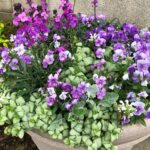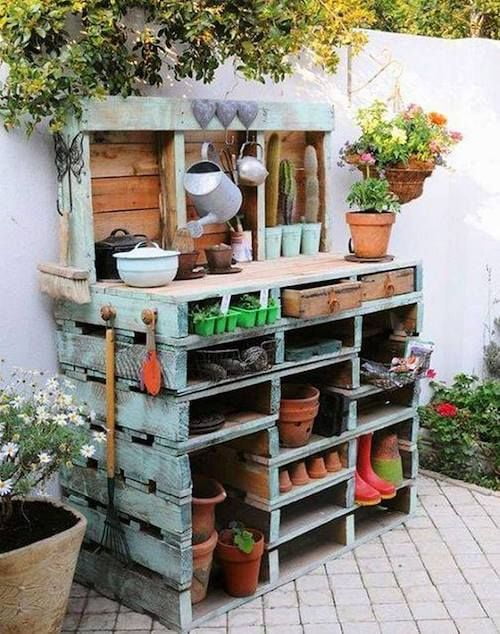Are you looking for creative and sustainable organic gardening ideas to start your own eco-friendly garden? In this article, we will explore the wonderful world of organic gardening and provide you with valuable tips on how to plan, maintain, and harvest your very own organic produce. Whether you’re a seasoned gardener or just starting out, these ideas will help you create a thriving garden that is not only good for the environment but also for your health.
Organic gardening involves growing fruits, vegetables, herbs, and flowers without the use of synthetic fertilizers, pesticides, or genetically modified organisms (GMOs). Instead, it focuses on natural processes to nourish the soil and support plant growth. By embracing organic gardening ideas, you can create a beautiful and productive garden while minimizing your impact on the environment.
In the following sections, we will delve into the various aspects of organic gardening such as the benefits of going organic, planning your garden layout, choosing the right plants for organic gardening, soil preparation and maintenance, natural pest control methods, composting and using organic fertilizers. We will also explore sustainable container gardening ideas that are perfect for urban spaces. Get ready to embark on an exciting journey towards embracing an eco-friendly and rewarding lifestyle through organic gardening.
Benefits of Organic Gardening
Organic gardening offers countless benefits for both the environment and your own health. By choosing to grow your produce organically, you are reducing the use of harmful chemicals and pesticides that can leach into soil and water sources.
This not only protects the surrounding ecosystem but also ensures that you are consuming food free from these toxins. Additionally, organic gardening promotes biodiversity as it encourages the growth of a variety of plants and beneficial insects, creating a more balanced and sustainable ecosystem.
Furthermore, organic gardening can have a positive impact on your overall well-being. Spending time outdoors tending to your garden has been proven to reduce stress and anxiety levels. The physical activity involved in gardening also provides a great form of exercise, contributing to better mental and physical health. In addition, there is a sense of satisfaction that comes from growing your produce naturally, knowing that you are supporting your health and the environment in the process.
Another key benefit of organic gardening is financial savings. By growing your fruits, vegetables, and herbs at home, you can significantly reduce grocery expenses while enjoying high-quality produce that is fresh, flavorful, and nutrient-rich. Ultimately, embracing organic gardening ideas allows you to lead a more sustainable lifestyle while reaping numerous rewards for yourself and the planet.
| Benefits | Impacts |
|---|---|
| Reduction of harmful chemicals | Protects ecosystem; Ensures consumption of toxin-free food |
| Promotes biodiversity | Encourages growth of various plants & beneficial insects; Creates balanced ecosystem |
| Improves well-being | Reduces stress & anxiety; Provides exercise; Satisfaction in natural produce |
| Financial savings | Reduced grocery expenses; Fresh & nutrient-rich produce |
Planning Your Organic Garden
When it comes to planning an organic garden, there are several key factors to consider in order to ensure a successful and bountiful harvest. Whether you are a seasoned gardener or new to the world of organic gardening, careful planning is essential for creating a thriving and sustainable garden. This section will provide useful tips and guidelines to help you plan your organic garden effectively.
Site Selection and Layout
The first step in planning your organic garden is selecting the right location. Choose a sunny spot with well-drained soil that is easily accessible for watering and maintenance. Consider the layout of your garden beds, taking into account factors such as companion planting, crop rotation, and maximizing space for optimal plant growth.
Seed Selection and Planting Schedule
Choosing the right plants for your organic garden is crucial to its success. Selecting seeds from reputable sources that are certified organic will ensure that you are starting off on the right foot. Research the best planting schedule for your specific region and climate, taking into account frost dates and seasonal variations.
Watering and Irrigation
Developing an efficient watering and irrigation system is essential for maintaining a healthy organic garden. Consider using drip irrigation or soaker hoses to minimize water waste and ensure that plants receive adequate moisture. Implementing rainwater harvesting techniques can also help reduce water usage while providing a sustainable water source for your garden.
By carefully considering these factors during the planning phase of your organic garden, you can set yourself up for success in creating a fruitful and beautiful space that thrives with minimal environmental impact. These ideas will help kickstart your journey into embracing the organic gardening lifestyle while ensuring that every aspect of your planning process aligns with sustainable practices.
Choosing the Right Plants for Organic Gardening
When it comes to organic gardening, selecting the right plants is crucial for a successful and thriving garden. By choosing the right plants for your organic garden, you can reduce the need for chemical pesticides and fertilizers, and create a more sustainable and environmentally friendly garden.
One of the key factors in choosing the right plants for organic gardening is to select native and adapted varieties that are well-suited to your specific climate and soil conditions. Native plants are naturally resistant to local pests and diseases, reducing the need for chemical interventions. Additionally, choosing plants that are well-adapted to your local environment will require less water and maintenance, making them an ideal choice for organic gardening.
In addition to native and adapted varieties, look for disease-resistant cultivars when selecting plants for your organic garden. Disease-resistant plants are less likely to succumb to common plant diseases, reducing the need for chemical treatments. Many nurseries offer disease-resistant varieties of popular vegetables, fruits, and flowers that are perfect for organic gardening.
Another important consideration when choosing plants for your organic garden is to select companion plants that support each other’s growth and deter pests. Companion planting is an age-old practice that involves growing certain plants together to enhance each other’s health and protect against pests without the need for chemicals. For example, planting marigolds alongside tomatoes can help deter nematodes, while growing basil next to tomatoes can improve their flavor and deter pests such as aphids.
| Aspect | Importance |
|---|---|
| Native and Adapted Varieties | Reduce need for chemical pesticides and fertilizers |
| Disease-Resistant Cultivars | Less likely succumb to common plant diseases |
| Companion Plants | Enhance each other’s health and protect against pests without chemicals |
Soil Preparation and Maintenance
When it comes to organic gardening, one of the most crucial aspects is soil preparation and maintenance. The health of your plants depends heavily on the quality and nutrients found in the soil. By taking the time to properly prepare and maintain the soil in your organic garden, you can ensure a bountiful harvest of healthy produce.
To begin, let’s start with some basic tips for soil preparation:
- Test the soil: Before planting anything, it’s essential to test your soil to determine its pH levels and nutrient content. You can purchase DIY testing kits or send a sample to a local agricultural extension service for analysis.
- Amend the soil: Based on the results of your soil test, you may need to amend your soil with organic matter such as compost, manure, or other natural fertilizers to improve its texture and fertility.
- Improve drainage: Ensure that your garden beds have proper drainage by incorporating organic materials like peat moss or perlite into the soil mix.
Once you have prepared your soil, it’s important to focus on maintaining its health throughout the growing season. Here are some tips for maintaining healthy organic garden soil:
- Steady watering: Consistent watering is crucial for keeping your garden’s soil moist but not waterlogged. Consider using mulch to help retain moisture and control weed growth.
- Crop rotation: To prevent the depletion of specific nutrients in the soil, practice crop rotation by alternating plant families each growing season.
- Add organic matter: Regularly adding compost or well-rotted manure to your garden beds helps replenish nutrients and improve overall soil structure.
By implementing these soil preparation and maintenance practices in your organic garden, you can create optimal growing conditions for your plants while promoting long-term sustainability in your gardening endeavors.
Natural Pest Control Methods
When it comes to organic gardening, one of the key aspects to consider is natural pest control. This is essential in maintaining a balanced ecosystem within your garden without relying on harmful chemicals. Here are some effective natural pest control methods to keep your garden thriving:
- Beneficial Insects: Introduce beneficial insects such as ladybugs, lacewings, and predatory beetles into your garden to help control pest populations. These insects feed on common garden pests like aphids, mites, and caterpillars.
- Companion Planting: Certain plants have natural pest-repelling properties that can be used to protect your crops. For example, planting marigolds alongside your vegetables can help deter nematodes and other soil-borne pests.
- Homemade Remedies: Create homemade insecticidal soaps and sprays using natural ingredients like garlic, neem oil, or hot pepper that are safe for the environment and effective in controlling pests.
By implementing these natural pest control methods, you can maintain a healthy balance in your organic garden while minimizing the impact on the environment.
Overall, embracing organic gardening ideas means incorporating sustainable practices into every aspect of your garden. From choosing the right plants to utilizing natural pest control methods, there are many ways to create a thriving organic garden that benefits both you and the environment. By following these principles of organic gardening, you can enjoy the beauty and bounty of a naturally sustainable garden while minimizing your impact on the planet.
Composting and Organic Fertilizers
Composting and using organic fertilizers are essential aspects of successful organic gardening. Composting is the process of recycling organic materials, such as food scraps, yard waste, and plant trimmings, into nutrient-rich soil amendments. This not only reduces waste but also provides a cost-effective way to improve soil fertility in your garden.
To start composting, you can create a compost pile or use a compost bin to contain the materials. It is important to mix green materials (like fruit and vegetable scraps) with brown materials (such as leaves and twigs) to create a balanced compost pile.
In addition to composting, using organic fertilizers is another key component of maintaining healthy soil in an organic garden. Organic fertilizers consist of natural ingredients like bone meal, fish emulsion, kelp meal, and composted manure.
These types of fertilizers provide essential nutrients for plant growth without the use of synthetic chemicals that can harm the environment. When choosing an organic fertilizer, be sure to select one that is suited for the specific needs of your plants and follow the application instructions carefully.
By implementing these composting and organic fertilizer practices in your garden, you can promote healthy soil structure and fertility while reducing your environmental impact. These sustainable methods not only benefit your plants but also contribute to the overall health of the ecosystem in which your garden resides.
Embracing these organic gardening ideas will help you build a more sustainable garden that thrives on natural processes and supports a healthier environment for you and future generations. Whether you have a traditional outdoor garden or prefer container gardening on a balcony or patio, integrating composting and organic fertilizers into your gardening routine will support the long-term success of your organic garden.
Harvesting and Preserving Your Organic Produce
After putting in all the hard work to cultivate your organic garden, it’s important to know when and how to harvest your produce. One of the key principles of organic gardening is harvesting fruits and vegetables at their peak ripeness, which not only ensures maximum flavor but also a higher nutritional content.
It’s crucial to familiarize yourself with the specific harvesting times for each type of plant in your garden – whether it be tomatoes, cucumbers, berries, or leafy greens. This will guarantee that you are picking them at their best quality.
Once you have successfully harvested your organic produce, it’s time to consider different methods for preserving them. There are numerous options available including canning, freezing, dehydrating, or even pickling your fruits and vegetables. Whichever method you choose, remember that the goal is to maintain their freshness while avoiding any potential loss of nutrients. Many organic gardeners enjoy creating homemade jams or pickles from their bountiful harvests as a way of cherishing their hard work throughout the year.
In addition to traditional preservation methods, another idea for making the most of your organic produce is by finding ways to incorporate them into homemade natural beauty products and household cleaners. For example, citrus peels can be used as an ingredient in homemade cleaning solutions, while herbs such as lavender and mint can be utilized for making essential oils and fragrances.
By creatively using every part of your harvest, you’ll not only reduce waste but also ensure that nothing goes to waste from your organic garden.
Creative and Sustainable Container Gardening Ideas
Container gardening is a great way to grow your own organic produce, even if you don’t have access to a large outdoor space. It’s perfect for urban dwellers, apartment residents, or anyone with limited yard space. In this section, we will explore some creative and sustainable container gardening ideas that will allow you to enjoy the benefits of organic gardening regardless of your living situation.
Upcycled Containers
One of the most sustainable approaches to container gardening is using upcycled containers. Instead of purchasing brand new pots and planters, consider repurposing items such as old wooden crates, tin cans, buckets, or even old bicycle baskets. This not only reduces waste but also adds a unique and eclectic touch to your garden.
Vertical Gardening
For those with limited horizontal space, vertical gardening is an excellent option. Utilize wall-mounted planters, hanging baskets, or create a DIY trellis system for climbing plants like cucumbers, tomatoes, or beans. Vertical gardening maximizes space while adding visual interest to your outdoor or indoor environment.
Self-Watering Containers
To promote sustainability and conserve water in your organic container garden, consider using self-watering containers. These innovative planters have built-in reservoirs that provide a consistent water supply to the plants without wasteful runoff. Some self-watering containers are even made from recycled materials, making them an eco-friendly choice.
By incorporating these creative and sustainable container gardening ideas into your organic gardening practices, you can cultivate a thriving garden while minimizing your environmental impact. Whether you’re growing herbs on a sunny balcony or cultivating vegetables in a small courtyard, container gardening offers endless possibilities for cultivating organic produce in any space.
Conclusion
In conclusion, organic gardening is not just a hobby or a way to grow delicious fruits and vegetables. It is a lifestyle that promotes sustainability, environmental consciousness, and personal wellness. By embracing the principles of organic gardening and implementing the ideas and methods discussed in this article, you can contribute to a healthier planet while also enjoying the satisfaction of growing your own food.
The benefits of organic gardening extend beyond just producing nutritious and chemical-free produce. It also helps to support biodiversity, conserve natural resources, improve soil quality, and reduce pollution. Additionally, by avoiding synthetic pesticides and fertilizers, you are creating a safe and healthy environment for yourself, your family, and local wildlife.
Whether you have limited space for a traditional garden or live in an urban setting, there are countless creative and sustainable container gardening ideas that can allow you to participate in organic gardening. From balcony herb gardens to DIY recycled material planters, there are endless possibilities for growing your own organic produce in any environment.
So why not take the first step toward embracing the organic gardening lifestyle today? Whether you’re a seasoned gardener or new to the world of horticulture, there are always new organic gardening ideas to explore and implement into your own garden.
Frequently Asked Questions
How Do You Start an Organic Garden for Beginners?
Starting an organic garden for beginners involves selecting the right location with good sunlight, preparing the soil with organic matter, choosing the right plants, and avoiding synthetic chemicals. It’s important to research and learn about organic gardening methods.
What Are the Rules for Organic Gardening?
Organic gardening follows certain rules such as not using synthetic pesticides or fertilizers, promoting biodiversity, rotating crops to prevent pest and disease buildup, and using natural methods to control pests like companion planting or beneficial insects. It also encourages soil building and composting.
What Is the Easiest Crop to Grow Organically?
The easiest crop to grow organically depends on various factors such as climate and soil conditions. However, some easy-to-grow organic crops for beginners include lettuce, tomatoes, radishes, herbs like basil or mint, and green beans. These crops typically require less maintenance and are more resistant to pests and diseases.

Welcome to my gardening blog! I am passionate about plants and enjoy sharing my knowledge and experiences with others. In this blog, I will write about everything related to gardening, from tips on how to get started to updates on my own garden projects.





